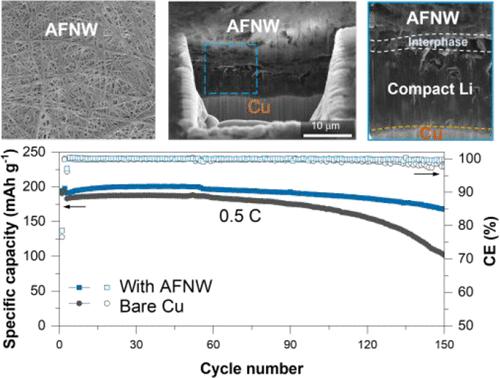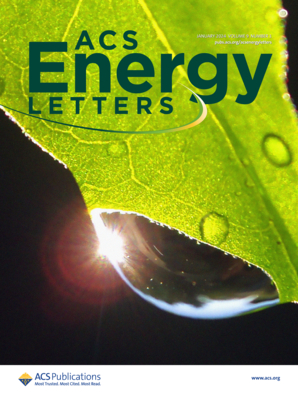A Conversion Aluminum Fluoride Nanowire Interlayer for Stable Lithium Metal Batteries
IF 19.3
1区 材料科学
Q1 CHEMISTRY, PHYSICAL
引用次数: 0
Abstract
The use of a lithium metal anode enables batteries with significantly higher energy density, but at the expense of the growth of lithium dendrites that trigger internal short circuits, induce safety risks, and reduce cycle stability. To address this challenge, here, we report the design of an aluminum fluoride nanowire membrane as a conversion interlayer to regulate lithium deposition for significantly more stable and safe lithium metal batteries. The interlayer generates a LiF-rich solid electrolyte interphase and alloy nanoparticles in contact with lithium to offer active sites guiding lithium nucleation, regulating lithium deposition, and increasing Coulombic efficiencies. With such an interlayer, lithium metal full cells show significantly improved stability compared to those with bare Cu, when paired with a LiFePO4 or LiNi0.8Co0.1Mn0.1O2 cathode. Our results indicate that using an aluminum fluoride interlayer can be a promising strategy in realizing lithium metal batteries with high specific energy density.

用于稳定金属锂电池的转换铝氟化物纳米线夹层
锂金属阳极的使用使电池具有更高的能量密度,但代价是锂枝晶的生长会引发内部短路,引发安全风险,并降低循环稳定性。为了解决这一挑战,我们设计了一种氟化铝纳米线膜作为转换中间层,以调节锂沉积,从而显著提高锂金属电池的稳定性和安全性。该中间层生成了富liff的固体电解质界面和与锂接触的合金纳米颗粒,提供了指导锂成核、调节锂沉积和提高库仑效率的活性位点。有了这样的中间层,当与LiFePO4或LiNi0.8Co0.1Mn0.1O2阴极搭配时,与裸Cu电池相比,锂金属充满电池的稳定性显著提高。我们的研究结果表明,使用氟化铝中间层是实现高比能密度锂金属电池的一种很有前途的策略。
本文章由计算机程序翻译,如有差异,请以英文原文为准。
求助全文
约1分钟内获得全文
求助全文
来源期刊

ACS Energy Letters
Energy-Renewable Energy, Sustainability and the Environment
CiteScore
31.20
自引率
5.00%
发文量
469
审稿时长
1 months
期刊介绍:
ACS Energy Letters is a monthly journal that publishes papers reporting new scientific advances in energy research. The journal focuses on topics that are of interest to scientists working in the fundamental and applied sciences. Rapid publication is a central criterion for acceptance, and the journal is known for its quick publication times, with an average of 4-6 weeks from submission to web publication in As Soon As Publishable format.
ACS Energy Letters is ranked as the number one journal in the Web of Science Electrochemistry category. It also ranks within the top 10 journals for Physical Chemistry, Energy & Fuels, and Nanoscience & Nanotechnology.
The journal offers several types of articles, including Letters, Energy Express, Perspectives, Reviews, Editorials, Viewpoints and Energy Focus. Additionally, authors have the option to submit videos that summarize or support the information presented in a Perspective or Review article, which can be highlighted on the journal's website. ACS Energy Letters is abstracted and indexed in Chemical Abstracts Service/SciFinder, EBSCO-summon, PubMed, Web of Science, Scopus and Portico.
 求助内容:
求助内容: 应助结果提醒方式:
应助结果提醒方式:


